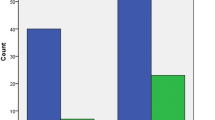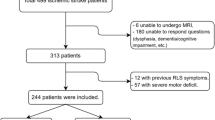Abstract
While dopaminergic dysfunction is believed to be a crucial role in restless legs syndrome (RLS), changes in peripheral microvasculature system such as peripheral hypoxia and altered skin temperature, have been found. This study aimed to investigate whether patients with RLS would have a cerebral and peripheral endothelial dysfunction, and this may have association with treatment responsiveness. We evaluated cerebral endothelial function using breath-holding index (BHI) on transcranial Doppler in bilateral middle cerebral artery (MCA), posterior cerebral artery (PCA) and basilar artery (BA) and peripheral endothelial function using brachial flow-mediated dilation (FMD) in 34 patients with RLS compared with age and sex-matched controls. The values of BHI in both MCA and BA were significantly lower in RLS group than control group. The values of FMD also were significantly lower in RLS patients. There was a weak correlation between BHI and FMD (p = 0.038 in Rt MCA, p = 0.032 in Lt MCA, p = 0.362 in BA) in RLS, but not in controls. BHI differed according to treatment responsiveness. (p < 0.005). Our study suggests that RLS patients have poorer cerebral and peripheral endothelial function than controls, showing an underlying mechanism of RLS and further evidence of a possible association between RLS and cardiovascular disease.




Similar content being viewed by others
References
Allen RP, Picchietti DL, Garcia-Borreguero D, Ondo WG, Walters AS, Winkelman JW, Zucconi M, Ferri R, Trenkwalder C, Lee HB, International Restless Legs Syndrome Study G (2014) Restless legs syndrome/Willis-Ekbom disease diagnostic criteria: updated International Restless Legs Syndrome Study Group (IRLSSG) consensus criteria–history, rationale, description, and significance. Sleep Med 15(8):860–873. https://doi.org/10.1016/j.sleep.2014.03.025
Anderson KN, Di Maria C, Allen J (2013) Novel assessment of microvascular changes in idiopathic restless legs syndrome (Willis-Ekbom disease). J Sleep Res 22(3):315–321. https://doi.org/10.1111/jsr.12025
Baskol G, Korkmaz S, Erdem F, Caniklioglu A, Kocyigit M, Aksu M (2012) Assessment of nitric oxide, advanced oxidation protein products, malondialdehyde, and thiol levels in patients with restless legs syndrome. Sleep Med 13(4):414–418. https://doi.org/10.1016/j.sleep.2011.11.012
Bertisch SM, Muresan C, Schoerning L, Winkelman JW, Taylor JA (2016) Impact of restless legs syndrome on cardiovascular autonomic control. Sleep 39(3):565–571. https://doi.org/10.5665/sleep.5528
Boulos MI, Murray BJ, Muir RT, Gao F, Szilagyi GM, Huroy M, Kiss A, Walters AS, Black SE, Lim AS, Swartz RH (2017) Periodic limb movements and white matter hyperintensities in first-ever minor stroke or high-risk transient ischemic attack. Sleep 40(3):zsw080. https://doi.org/10.1093/sleep/zsw080
Calvin AD, Covassin N, Kremers WK, Adachi T, Macedo P, Albuquerque FN, Bukartyk J, Davison DE, Levine JA, Singh P, Wang S, Somers VK (2014) Experimental sleep restriction causes endothelial dysfunction in healthy humans. J Am Heart Assoc 3(6):e001143. https://doi.org/10.1161/jaha.114.001143
Celermajer DS (1997) Endothelial dysfunction: does it matter? Is it reversible? J Am Coll Cardiol 30(2):325–333
Cho YW, Kim KT, Lee YS, Moon HJ, Chang H, Ku J, Lee HB (2016) White matter hyperintensities on brain magnetic resonance imaging: comparison of early-onset and late-onset restless legs syndrome. Sleep Med 25:4–7. https://doi.org/10.1016/j.sleep.2016.06.032
Craig AD (2002) How do you feel? Interoception: the sense of the physiological condition of the body. Nat Rev Neurosci 3(8):655–666. https://doi.org/10.1038/nrn894
Ekbom KA (1960) Restless legs syndrome. Neurology 10:868–873. https://doi.org/10.1212/wnl.10.9.868
Erdelyi-Botor S, Komaromy H, Kamson DO, Kovacs N, Perlaki G, Orsi G, Molnar T, Illes Z, Nagy L, Keki S, Deli G, Bosnyak E, Trauninger A, Pfund Z (2017) Serum l-arginine and dimethylarginine levels in migraine patients with brain white matter lesions. Cephalalgia 37(6):571–580. https://doi.org/10.1177/0333102416651454
Ferri R, Cosentino FI, Moussouttas M, Lanuzza B, Arico D, Bagai K, Wang L, McLaughlin B, Walters AS (2016) Silent cerebral small vessel disease in restless legs syndrome. Sleep 39(7):1371–1377. https://doi.org/10.5665/sleep.5966
Fujiwara Y, Mizuno T, Okuyama C, Nagakane Y, Watanabe-Hosomi A, Kondo M, Kuriyama N, Tokuda T, Matsushima S, Nishimura T, Nakagawa M (2012) Simultaneous impairment of intracranial and peripheral artery vasoreactivity in CADASIL patients. Cerebrovasc Dis (Basel, Switzerland) 33(2):128–134. https://doi.org/10.1159/000334185
Gottlieb DJ, Somers VK, Punjabi NM, Winkelman JW (2017) Restless legs syndrome and cardiovascular disease: a research roadmap. Sleep Med 31:10–17. https://doi.org/10.1016/j.sleep.2016.08.008
Gulbenkian S, Uddman R, Edvinsson L (2001) Neuronal messengers in the human cerebral circulation. Peptides 22(6):995–1007
Hoyos CM, Melehan KL, Liu PY, Grunstein RR, Phillips CL (2015) Does obstructive sleep apnea cause endothelial dysfunction? A critical review of the literature. Sleep Med Rev 20:15–26. https://doi.org/10.1016/j.smrv.2014.06.003
Jimenez-Jimenez FJ, Alonso-Navarro H, Martinez C, Zurdo M, Turpin-Fenoll L, Millan-Pascual J, Adeva-Bartolome T, Cubo E, Navacerrada F, Rojo-Sebastian A, Rubio L, Calleja M, Plaza-Nieto JF, Pilo-de-la-Fuente B, Arroyo-Solera M, Garcia-Albea E, Garcia-Martin E, Agundez JA (2015) Neuronal nitric oxide synthase (nNOS, NOS1) rs693534 and rs7977109 variants and risk for restless legs syndrome. J Neural Transm (Vienna, Austria: 1996) 122(6):819–823. https://doi.org/10.1007/s00702-014-1322-z
Jimenez-Jimenez FJ, Alonso-Navarro H, Garcia-Martin E, Agundez JAG (2019) Neurochemical features of idiopathic restless legs syndrome. Sleep Med Rev 45:70–87. https://doi.org/10.1016/j.smrv.2019.03.006
Joannides R, Haefeli WE, Linder L, Richard V, Bakkali EH, Thuillez C, Lüscher TF (1995) Nitric oxide is responsible for flow-dependent dilatation of human peripheral conduit arteries in vivo. Circulation 91(5):1314–1319. https://doi.org/10.1161/01.CIR.91.5.1314
Koh SY, Kim MS, Lee SM, Hong JM, Yoon JH (2015) Impaired vascular endothelial function in patients with restless legs syndrome: a new aspect of the vascular pathophysiology. J Neurol Sci 359(1–2):207–210. https://doi.org/10.1016/j.jns.2015.10.041
Lee MJ, Park BY, Cho S, Park H, Chung CS (2019) Cerebrovascular reactivity as a determinant of deep white matter hyperintensities in migraine. Neurology 92(4):e342–e350. https://doi.org/10.1212/wnl.0000000000006822
Li Y, Li Y, Winkelman JW, Walters AS, Han J, Hu FB, Gao X (2018) Prospective study of restless legs syndrome and total and cardiovascular mortality among women. Neurology 90(2):e135–e141. https://doi.org/10.1212/wnl.0000000000004814
Matsuzawa Y, Kwon TG, Lennon RJ, Lerman LO, Lerman A (2015) Prognostic value of flow-mediated vasodilation in brachial artery and fingertip artery for cardiovascular events: a systematic review and meta-analysis. J Am Heart Assoc 4(11):e002270. https://doi.org/10.1161/jaha.115.002270
Mitchell UH, Hilton SC, Hunsaker E, Ulfberg J (2016) Decreased symptoms without augmented skin blood flow in subjects with RLS/WED after vibration treatment. J Clin Sleep Med 12(7):947–952. https://doi.org/10.5664/jcsm.5920
Muller M, Voges M, Piepgras U, Schimrigk K (1995) Assessment of cerebral vasomotor reactivity by transcranial Doppler ultrasound and breath-holding. A comparison with acetazolamide as vasodilatory stimulus. Stroke 26(1):96–100
Oskarsson E, Wahlin-Larsson B, Ulfberg J (2014) Reduced daytime intramuscular blood flow in patients with restless legs syndrome/Willis-Ekbom disease. Psychiatry Clin Neurosci 68(8):640–643. https://doi.org/10.1111/pcn.12170
Palazzo P, Maggio P, Passarelli F, Altavilla R, Altamura C, Pasqualetti P, Vernieri F (2013) Lack of correlation between cerebral vasomotor reactivity and flow-mediated dilation in subjects without vascular disease. Ultrasound Med Biol 39(1):10–15. https://doi.org/10.1016/j.ultrasmedbio.2012.08.022
Patton SM, Ponnuru P, Snyder AM, Podskalny GD, Connor JR (2011) Hypoxia-inducible factor pathway activation in restless legs syndrome patients. Eur J Neurol 18(11):1329–1335. https://doi.org/10.1111/j.1468-1331.2011.03397.x
Rajan R, Khurana D, Lal V (2015) Interictal cerebral and systemic endothelial dysfunction in patients with migraine: a case–control study. J Neurol Neurosurg Psychiatry 86(11):1253–1257. https://doi.org/10.1136/jnnp-2014-309571
Salminen AV, Rimpila V, Polo O (2014a) Peripheral hypoxia in restless legs syndrome (Willis-Ekbom disease). Neurology 82(21):1856–1861. https://doi.org/10.1212/WNL.0000000000000454
Salminen AV, Rimpila V, Polo O (2014b) Pramipexole alters thermoregulation in restless legs syndrome. J Clin Sleep Med 10(12):1325–1329. https://doi.org/10.5664/jcsm.4290
Sam K, Crawley AP, Conklin J, Poublanc J, Sobczyk O, Mandell DM, Venkatraghavan L, Duffin J, Fisher JA, Black SE, Mikulis DJ (2016) Development of white matter hyperintensity is preceded by reduced cerebrovascular reactivity. Ann Neurol 80(2):277–285. https://doi.org/10.1002/ana.24712
Schurks M, Winter A, Berger K, Kurth T (2014) Migraine and restless legs syndrome: a systematic review. Cephalalgia 34(10):777–794. https://doi.org/10.1177/0333102414537725
Stout M (2009) Flow-mediated dilatation: a review of techniques and applications. Echocardiography 26(7):832–841. https://doi.org/10.1111/j.1540-8175.2009.00927.x
Trinity JD, Groot HJ, Layec G, Rossman MJ, Ives SJ, Morgan DE, Gmelch BS, Bledsoe A, Richardson RS (2015) Passive leg movement and nitric oxide-mediated vascular function: the impact of age. Am J Physiol Heart Circ Physiol 308(6):H672–H679. https://doi.org/10.1152/ajpheart.00806.2014
Ulfberg J (2012) Treatment of restless legs syndrome with a nitroglycerin patch. Sleep Med 13(10):1326. https://doi.org/10.1016/j.sleep.2012.09.011
Vallance P, Chan N (2001) Endothelial function and nitric oxide: clinical relevance. Heart 85(3):342–350
Wåhlin-Larsson B, Ulfberg J, Aulin KP, Kadi F (2009) The expression of vascular endothelial growth factor in skeletal muscle of patients with sleep disorders. Muscle Nerve 40(4):556–561. https://doi.org/10.1002/mus.21357
Walters AS, LeBrocq C, Dhar A, Hening W, Rosen R, Allen RP, Trenkwalder C, International Restless Legs Syndrome Study G (2003) Validation of the international restless legs syndrome study group rating scale for restless legs syndrome. Sleep Med 4(2):121–132
Winkelman JW (1999) The evoked heart rate response to periodic leg movements of sleep. Sleep 22(5):575–580. https://doi.org/10.1093/sleep/22.5.575
Winkelman JW, Blackwell T, Stone K, Ancoli-Israel S, Redline S (2017) Associations of incident cardiovascular events with restless legs syndrome and periodic leg movements of sleep in older men, for the outcomes of sleep disorders in older men study (MrOS Sleep Study). Sleep 40(4):zsx023. https://doi.org/10.1093/sleep/zsx023
Winkelmann J, Lichtner P, Schormair B, Uhr M, Hauk S, Stiasny-Kolster K, Trenkwalder C, Paulus W, Peglau I, Eisensehr I, Illig T, Wichmann HE, Pfister H, Golic J, Bettecken T, Putz B, Holsboer F, Meitinger T, Muller-Myhsok B (2008) Variants in the neuronal nitric oxide synthase (nNOS, NOS1) gene are associated with restless legs syndrome. Mov Disord 23(3):350–358. https://doi.org/10.1002/mds.21647
Zanigni S, Giannini G, Melotti R, Pattaro C, Provini F, Cevoli S, Facheris MF, Cortelli P, Pramstaller PP (2014) Association between restless legs syndrome and migraine: a population-based study. Eur J Neurol 21(9):1205–1210. https://doi.org/10.1111/ene.12462
Zupan M, Sabovic M, Zaletel M, Popovic KS, Zvan B (2015) The presence of cerebral and/or systemic endothelial dysfunction in patients with leukoaraiosis–a case control pilot study. BMC Neurol 15:158. https://doi.org/10.1186/s12883-015-0416-z
Acknowledgements
This research was supported by the Basic Science Research Program through the National Research Foundation of Korea funded by the Ministry of Education (no. NRF-2017R1C1B5018378 (J.H.Y), NRF-2018M3A9E8023859 (J.H.Y) and the intramural research fund of Ajou University of medical center.
Author information
Authors and Affiliations
Contributions
KMS: research project: execution; imaging analysis: execution. PDG: research project: execution; imaging analysis: execution. YJH: research project: conception; imaging analysis: design; manuscript: review and critique.
Corresponding author
Ethics declarations
Conflict of interest
Nothing to report.
Additional information
Publisher's Note
Springer Nature remains neutral with regard to jurisdictional claims in published maps and institutional affiliations.
Rights and permissions
About this article
Cite this article
Kim, M.S., Park, D.G. & Yoon, J.H. Impaired endothelial function may predict treatment response in restless legs syndrome. J Neural Transm 126, 1051–1059 (2019). https://doi.org/10.1007/s00702-019-02031-x
Received:
Accepted:
Published:
Issue Date:
DOI: https://doi.org/10.1007/s00702-019-02031-x




